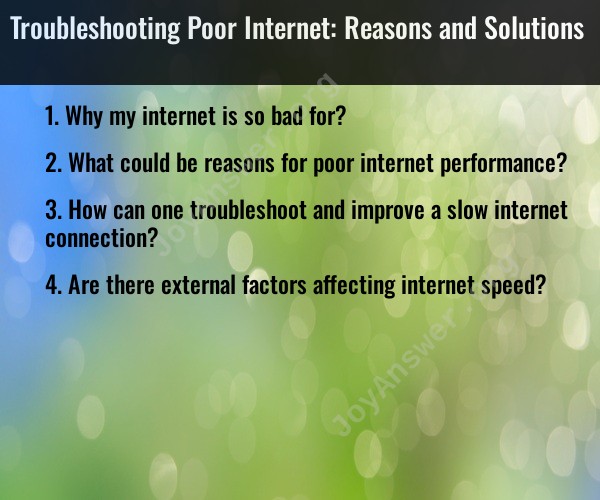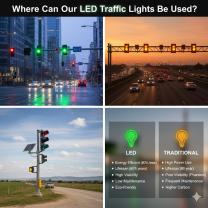Why my internet is so bad for?
Poor internet connectivity can be caused by various factors. Troubleshooting the issue involves identifying the possible reasons and implementing solutions. Here are some common reasons for poor internet and potential solutions:
Network Congestion:
- Reason: During peak hours, when many users are online, network congestion can occur, leading to slower internet speeds.
- Solution: Try using the internet during off-peak hours, or contact your service provider to inquire about network congestion in your area.
Router Placement:
- Reason: The location of your router can impact the strength of the Wi-Fi signal. Walls and obstacles can interfere with the signal.
- Solution: Place the router in a central location, away from walls and obstructions. Elevate it if possible and ensure it's not surrounded by electronic devices that may interfere with the signal.
Interference from Other Devices:
- Reason: Other electronic devices, such as cordless phones and microwave ovens, can interfere with Wi-Fi signals.
- Solution: Keep Wi-Fi routers away from devices that emit interference. Consider using devices on different frequency bands (e.g., 5 GHz instead of 2.4 GHz).
Outdated Equipment:
- Reason: Old routers or outdated equipment may not support newer technologies, leading to slower speeds.
- Solution: Upgrade your router or modem to a newer model that supports the latest Wi-Fi standards.
Bandwidth Limitations:
- Reason: Some internet plans have data caps or limitations on bandwidth, leading to reduced speeds once a certain threshold is reached.
- Solution: Check your internet plan for data limitations. Consider upgrading to a plan with higher bandwidth if needed.
Malware or Viruses:
- Reason: Malware or viruses on your devices can consume bandwidth and slow down internet speeds.
- Solution: Run antivirus and anti-malware scans on your devices. Ensure that your security software is up to date.
Background Applications and Updates:
- Reason: Background applications and automatic updates can consume bandwidth without your knowledge.
- Solution: Check for and limit background applications and schedule large updates during off-peak hours.
ISP Issues:
- Reason: Internet Service Provider (ISP) issues, such as maintenance, technical problems, or outages.
- Solution: Contact your ISP to inquire about any ongoing issues or outages in your area. They can provide information on the status of your connection.
Wi-Fi Interference from Neighbors:
- Reason: Multiple Wi-Fi networks in close proximity can interfere with each other.
- Solution: Change your Wi-Fi channel to reduce interference. Use Wi-Fi analyzer tools to identify the least congested channel.
Faulty Hardware:
- Reason: Faulty cables, connectors, or network equipment can contribute to poor internet connectivity.
- Solution: Check and replace any faulty cables or connectors. If the issue persists, consider contacting your ISP or IT support.
If you've tried these solutions and still experience poor internet connectivity, it's advisable to contact your Internet Service Provider for further assistance. They can perform diagnostics and address issues related to your specific connection.
1. Reasons for Poor Internet Performance
Numerous factors can contribute to poor internet performance, including:
Internet Service Provider (ISP) Issues: Outages, network congestion, or throttling by your ISP can significantly slow down your internet speed.
Router Issues: An outdated or malfunctioning router can cause signal interference, reduced range, and overall performance degradation.
Device Issues: Older devices, software issues, or multiple devices simultaneously consuming bandwidth can strain your internet connection.
Wireless Interference: Physical obstacles, interference from neighboring Wi-Fi networks, or electronic devices can disrupt Wi-Fi signals.
Data Usage Exceeding Plan Limits: If you exceed your ISP's data usage limits, your speed may be throttled to reduce bandwidth consumption.
2. Troubleshooting and Improving Slow Internet Connection
To troubleshoot and improve a slow internet connection, follow these steps:
Restart your router and modem: A simple restart can often fix temporary glitches and improve performance.
Check for ISP outages: Visit your ISP's website or social media channels to see if there are any reported outages in your area.
Move your router to a central location: Ensure your router is positioned in a central location, away from obstacles and potential interference.
Connect directly via Ethernet: If Wi-Fi is slow, try connecting your device directly to the router using an Ethernet cable for a more stable connection.
Limit bandwidth-intensive activities: Avoid using multiple devices simultaneously for streaming, downloading, or online gaming.
Update router firmware and device software: Ensure your router and connected devices have the latest firmware and software updates.
Consider upgrading your ISP plan: If your current plan is insufficient for your data usage needs, consider upgrading to a higher-speed plan.
Contact your ISP for assistance: If the issue persists, contact your ISP's technical support for further troubleshooting and potential repair or replacement of equipment.
3. External Factors Affecting Internet Speed
External factors beyond your control can also affect internet speed:
Peak usage times: Internet traffic tends to be heavier during peak hours, such as evenings and weekends, leading to slower speeds.
Distance from ISP infrastructure: If you live far from your ISP's infrastructure, your signal strength and internet speed may be affected.
Weather conditions: Heavy rain, snow, or storms can temporarily disrupt internet service or slow down transmission speeds.
Network maintenance or upgrades: ISPs may occasionally perform maintenance or upgrades on their infrastructure, which can temporarily affect internet speed.
By understanding the potential causes of poor internet performance and implementing appropriate troubleshooting measures, you can improve your internet connection and enjoy a more seamless online experience.













